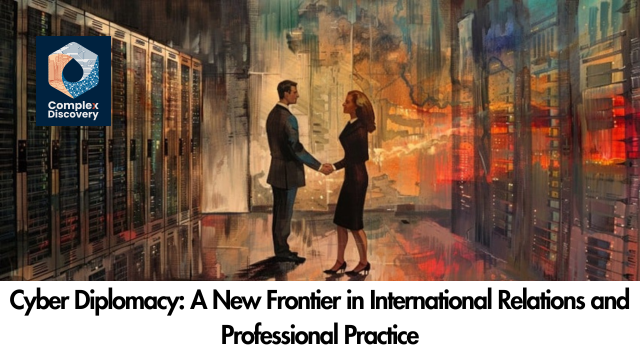
[EDRM Editor’s Note: This article was first published here on June 21, 2024, and EDRM is grateful to Rob Robinson and ComplexDiscovery for permission to republish.]

ComplexDisocvery’s Editor’s Note: This article underscores the growing significance of cyber diplomacy in the context of global security and international relations. As cyber threats become increasingly sophisticated and pervasive, the need for effective diplomatic strategies to address these challenges has never been more urgent. George Christou’s recent publication, “Cyber Diplomacy: From Concept to Practice,” part of the Tallinn Papers series by the NATO Cooperative Cyber Defence Centre of Excellence (CCDCOE), provides a comprehensive overview of this critical field. The Tallinn Papers are scholarly articles designed to inform strategic dialogue on cybersecurity within NATO and beyond. This latest paper offers valuable insights into the evolution, practical applications, and future directions of cyber diplomacy. For cybersecurity, information governance, and eDiscovery professionals, understanding the intricacies of cyber diplomacy is essential for navigating the complex digital landscape and ensuring a secure and resilient cyberspace.
In a new publication from the NATO Cooperative Cyber Defence Centre of Excellence, expert George Christou unveils the critical role of cyber diplomacy in shaping international security and professional practices across multiple disciplines. The paper, “Cyber Diplomacy: From Concept to Practice,” argues that as cybersecurity becomes an increasingly vital national and international priority, diplomatic efforts are essential to establish norms, build trust, and prevent conflicts in cyberspace.
Christou defines cyber diplomacy as “the use of diplomatic tools to manage and resolve problems in cyberspace.” This emerging field extends traditional diplomatic practices to address issues such as cyber threats, cybercrime, and the militarization of cyberspace. The paper emphasizes that cyber diplomacy should be considered an equal and essential part of a broader and holistic state cybersecurity policy toolbox.
As the digital age progresses, the importance of understanding and engaging with cyber diplomacy will only continue to grow, making it an essential area of knowledge for those involved in managing and securing our digital future.
Rob Robinson, ComplexDiscovery.
The publication outlines how various nations and organizations are adapting to this new reality. The United States established its Office of the Coordinator for Cyber Issues in 2011, which has since evolved into the Bureau of Cyberspace and Digital Policy. The European Union has developed a comprehensive approach, including a cyber diplomacy toolbox with measures ranging from political dialogues to sanctions. Other countries, such as Estonia and Denmark, have appointed cyber ambassadors or representatives to spearhead their cyber diplomatic efforts.
However, the field faces significant challenges. Christou points out the absence of a universally accepted international framework for cyberspace governance and the divergent interests among countries. The rapid advancement of technologies like artificial intelligence and quantum computing introduces new vulnerabilities, further complicating diplomatic efforts. Additionally, the paper highlights the difficulties in attributing cyber attacks and the delicate balance required when involving the private sector in matters of national cybersecurity.
International organizations play a crucial role in fostering cyber diplomacy. The United Nations, through its Group of Governmental Experts and Open-Ended Working Group, has been working to establish norms for responsible state behavior in cyberspace. NATO has integrated cyber defense into its core tasks, while the Organization for Security and Co-operation in Europe is developing confidence-building measures to reduce conflict risks.
Looking to the future, Christou stresses the importance of bridging ideological divides between states, enhancing international cooperation, and integrating cyber diplomacy into broader foreign policy frameworks. He calls for increased investment in training and capacity-building for cyber diplomats to address the complex challenges ahead.
The implications of this evolving landscape extend far beyond the realm of international relations, directly impacting professionals in cybersecurity, information governance, and eDiscovery.
For cybersecurity professionals, understanding the diplomatic context of cyber threats is crucial. As nation-states engage in cyber diplomacy, the nature and scope of potential threats evolve. Knowledge of international norms, agreements, and ongoing diplomatic efforts can inform more effective cybersecurity strategies and help organizations anticipate and prepare for emerging risks.
Information governance professionals must be aware of the changing international regulatory landscape shaped by cyber diplomatic efforts. As nations negotiate and establish new norms for behavior in cyberspace, this can lead to new compliance requirements and best practices for data protection, privacy, and cross-border data transfers. Staying informed about these diplomatic developments is essential for maintaining robust and compliant information governance frameworks.
For eDiscovery professionals, the implications are twofold. First, as international cyber norms develop, they may influence how digital evidence is collected, preserved, and presented in legal proceedings, especially in cases involving multiple jurisdictions. Second, the increasing complexity of cyber incidents, potentially involving state actors, may require eDiscovery professionals to adapt their methodologies and tools to handle more sophisticated and geopolitically sensitive data.
Moreover, all these professionals must be prepared for the potential consequences of cyber diplomatic actions, such as sanctions or restrictions on technology use, which could impact their work and the technologies they rely on.
Knowledge of international norms, agreements, and ongoing diplomatic efforts can inform more effective cybersecurity strategies and help organizations anticipate and prepare for emerging risks.
Rob Robinson, ComplexDiscovery.
As cyber threats continue to evolve, this NATO publication serves as a timely resource for policymakers, diplomats, and professionals across various fields. It underscores the critical role of cyber diplomacy in shaping a stable, secure, and resilient digital world for the 21st century. The paper concludes that while progress has been made, significant work remains to refine and implement effective cyber diplomatic practices globally.
This publication highlights the need for professionals in cybersecurity, information governance, and eDiscovery to broaden their perspective beyond technical and legal considerations. They must now also consider the geopolitical and diplomatic context of cyberspace to effectively protect their organizations, ensure compliance, and navigate the complexities of digital evidence in an increasingly interconnected and politically charged digital world. As the digital age progresses, the importance of understanding and engaging with cyber diplomacy will only continue to grow, making it an essential area of knowledge for those involved in managing and securing our digital future.
Read the original release here.
News Sources
- New Tallinn Paper focuses on Cyber Diplomacy Concepts and Practices
- Tallinn Paper: Cyber Diplomacy: From Concept to Practice
Additional Reading
- Alarming Insurance Gaps and Soaring Breach Rates Call for a United Front in Cybersecurity
- Ambient Light Sensors to Malware Threats: MIT Unveils Smartphone Privacy Risks Amid Market Turbulence
Source: ComplexDiscovery OÜ
Assisted by GAI and LLM Technologies per EDRM GAI and LLM Policy.

